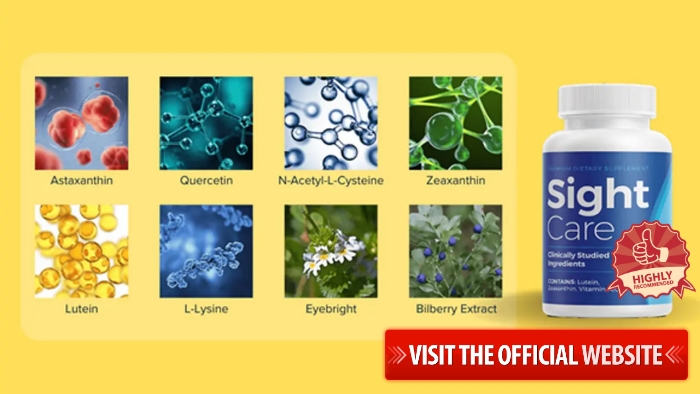
Maintaining optimal eye health is crucial in a world where screen time, environmental stressors, and aging can negatively impact vision. Eye-related issues like blurred vision, macular degeneration, dry eyes, and poor night vision are common concerns for many.
Sightcare is a dietary supplement designed to support and maintain healthy eyesight by providing essential nutrients and herbal extracts. In this article, we’ll explore the key ingredients, benefits, potential side effects, and customer reviews of Sight Care to help determine whether it’s a viable option for promoting better vision and eye health.
Order From Official Website
The Importance of Eye Health
Vision is one of the most important senses that allows us to navigate and engage with the world around us. With the increased reliance on digital devices and exposure to blue light, taking preventive measures to maintain healthy eyesight has become more crucial than ever. Beyond screen time, factors like aging, poor diet, and environmental pollutants can all contribute to declining eye health. Regular eye care routines, a nutrient-rich diet, and supplementation play a significant role in preserving sharp vision and preventing age-related eye conditions.
What Is Sight Care?
Sight Care is a nutritional supplement formulated to enhance eye health, improve vision, and provide overall wellness benefits. The product is marketed as a natural remedy containing a blend of vitamins, minerals, and plant extracts that work together to support vision and protect against oxidative stress. Sight Care Reviews claims to deliver results by targeting the root causes of declining eye health, including inflammation, free radical damage, and nutrient deficiencies.
Key Ingredients in Sight Care
To understand how Sight Care works, it's essential to delve into its ingredients. The supplement is packed with natural compounds, each playing a role in enhancing and protecting vision. Here’s a breakdown of some of the core ingredients:
1. Lutein and Zeaxanthin: These are carotenoids found in high concentrations in the retina. Lutein and zeaxanthin are known to filter harmful blue light and provide antioxidant protection to the eyes. Numerous studies show that these carotenoids can help reduce the risk of age-related macular degeneration (AMD) and cataracts.
2. Vitamin A: Essential for maintaining a clear cornea and supporting night vision, vitamin A is a well-established nutrient for eye health. It helps in the production of rhodopsin, a pigment vital for seeing in low-light conditions.
3. Bilberry Extract: Bilberry is rich in anthocyanins, which are potent antioxidants that support healthy blood flow to the eyes. Bilberry extract is traditionally used to enhance night vision and reduce eye strain, especially after prolonged exposure to screens.
4. Quercetin: This flavonoid has anti-inflammatory properties that protect the eyes from oxidative stress and free radical damage. Quercetin also supports the health of the retina and lens, potentially reducing the risk of cataracts.
5. Zinc: Zinc is an essential mineral that plays a crucial role in transporting vitamin A from the liver to the retina to produce melanin, a pigment that protects the eyes. Zinc deficiencies have been linked to poor night vision and other visual impairments.
6. N-Acetyl Cysteine (NAC): NAC is a powerful antioxidant known for its ability to replenish glutathione levels in the body. Glutathione is one of the body’s primary antioxidants, essential for protecting cells in the eyes from oxidative stress.
7. Eyebright: A traditional herbal remedy, eyebright has been used for centuries to treat eye infections, inflammation, and general eye fatigue. It is believed to have properties that soothe irritated eyes and reduce redness.
8. Lycopene: Lycopene is a carotenoid with strong antioxidant properties. It is found in tomatoes and other red fruits and has been associated with a lower risk of developing cataracts and age-related macular degeneration.
How Does Sight Care Work?
Sight Care works through a combination of protective, supportive, and regenerative mechanisms. The ingredients in Sight Care offer antioxidant protection, which is critical for reducing oxidative stress that can damage the delicate tissues of the eyes. Antioxidants like lutein, zeaxanthin, and NAC prevent free radicals from harming the retina and lens.
The supplement also targets inflammation, a common factor in eye conditions like dry eyes, AMD, and uveitis. Quercetin and eyebright help reduce inflammation, thereby protecting the eyes from further damage.
In addition, Sight Care supports the delivery of essential nutrients to the eyes. Vitamins A and zinc are crucial for maintaining sharp vision, especially in low-light conditions. By ensuring these nutrients are adequately supplied, Sight Care may improve night vision and reduce eye strain.
Order From Official Website
Benefits of Sight Care
Sight Care is marketed with several key benefits. Here are some of the notable advantages associated with regular use:
1. Enhanced Visual Clarity: Sight Care is designed to sharpen vision and reduce blurriness by nourishing the eyes with essential nutrients that maintain eye health.
2. Protection Against Blue Light: Lutein and zeaxanthin are known to filter harmful blue light from screens, reducing digital eye strain and protecting the retina from damage.
3. Improved Night Vision: With ingredients like vitamin A and bilberry extract, Sight Care can potentially enhance the ability to see in low-light environments, making it easier to drive at night or navigate dark spaces.
4. Reduced Risk of Eye Diseases: By delivering antioxidants and anti-inflammatory compounds, Sight Care may help reduce the risk of developing common eye conditions such as cataracts and AMD.
5. Support for Overall Eye Comfort: The combination of eyebright and bilberry extract helps soothe eye irritation, reduce dryness, and relieve strain after long hours of screen exposure.
Potential Side Effects and Safety Concerns
While Sight Care is made from natural ingredients and is generally considered safe, some individuals may experience side effects or allergic reactions. Here are some considerations:
1. Mild Digestive Issues: Some users might experience stomach upset or nausea, especially when taking the supplement on an empty stomach.
2. Allergic Reactions: Although rare, individuals with allergies to any of the herbal components, such as bilberry or eyebright, should be cautious.
3. Interactions with Medications: Certain ingredients like NAC and quercetin can interact with medications. Individuals taking blood thinners or medications for chronic conditions should consult their healthcare provider before using Sight Care.
4. Pregnancy and Nursing: Pregnant or breastfeeding women should seek medical advice before taking any dietary supplements, including Sight Care.
Customer Reviews and Testimonials
Customer reviews of Sight Care Supplement provide valuable insights into the product’s efficacy. Many users have reported positive experiences, noting improvements in clarity, reduced eye strain, and better night vision. Here are some highlights from customer feedback:
· Improved Clarity and Focus: Several users mentioned that their vision became noticeably clearer within a few weeks of using Sight Care. Blurriness, particularly when using screens, was significantly reduced.
· Better Night Vision: Some customers noted enhanced ability to see in low light after taking Sight Care regularly, making activities like driving at night safer and more comfortable.
· Reduced Eye Fatigue: Those who spend long hours in front of digital devices reported a decrease in eye fatigue and discomfort. They also mentioned that their eyes felt less strained even after extended screen time.
· General Wellness Benefits: A few users also highlighted secondary benefits like feeling more energized and experiencing less overall inflammation, suggesting that the supplement’s antioxidant properties had broader health benefits.
Order From Official Website
Of course, not all reviews are entirely positive. A small percentage of users indicated that they didn’t experience significant changes in their vision after using Sight Care. Some also noted that the results were gradual and subtle, requiring consistent use over a longer period.
=
=
==
=
=
=
=
==
=
=


